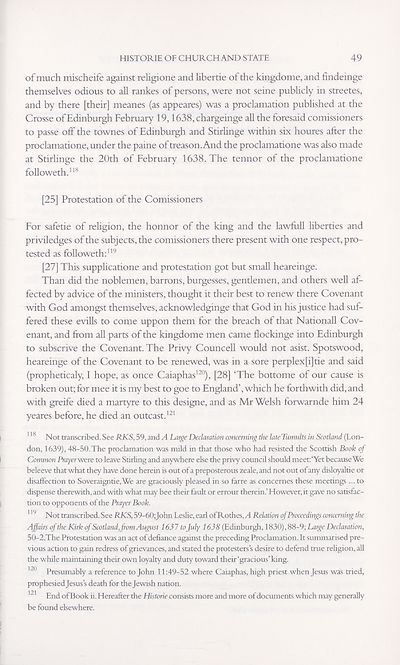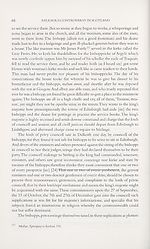Series 5 > Religious Controversy in Scotland 1625-1639
(64) Page 49
Download files
Complete book:
Individual page:
Thumbnail gallery: Grid view | List view

HISTORIE OF CHURCH AND STATE
49
of much mischeife against religione and libertie of the kingdome, and findeinge
themselves odious to all rankes of persons, were not seine publicly in streetes,
and by there [their] meanes (as appeares) was a proclamation published at the
Crosse of Edinburgh February 19,1638, chargeinge all the foresaid comissioners
to passe off the townes of Edinburgh and Stirlinge within six houres after the
proclamatione, under the paine of treason. And the proclamatione was also made
at Stirlinge the 20th of February 1638. The tennor of the proclamatione
followeth.118
[25] Protestation of the Comissioners
For safetie of religion, the honnor of the king and the lawfull liberties and
priviledges of the subjects, the comissioners there present with one respect, pro¬
tested as followeth:119
[27] This supplicatione and protestation got but small heareinge.
Than did the noblemen, barrens, burgesses, gentlemen, and others well af¬
fected by advice of the ministers, thought it their best to renew there Covenant
with God amongst themselves, acknowledginge that God in his justice had suf¬
fered these evills to come uppon them for the breach of that Nationall Cov¬
enant, and from all parts of the kingdome men came flockinge into Edinburgh
to subscrive the Covenant. The Privy Councell would not asist. Spotswood,
heareinge of the Covenant to be renewed, was in a sore perplex[i]tie and said
(propheticaly, I hope, as once Caiaphas120), [28] ‘The bottome of our cause is
broken out; for mee it is my best to goe to England’, which he forthwith did, and
with greife died a martyre to this designe, and as Mr Welsh forwarnde him 24
yeares before, he died an outcast.121
118 Not transcribed. See RKS, 59, and A Large Declaration concerning the late Tumults in Scotland (Lon¬
don, 1639), 48-50.The proclamation was mild in that those who had resisted the Scottish Book of
Common Prayer were to leave Stirling and anywhere else the privy council should meet:‘Yet because We
beleeve that what they have done herein is out of a preposterous zeale, and not out of any disloyaltie or
disaffection to Soveraigntie,We are graciously pleased in so farre as concernes these meetings ... to
dispense therewith, and with what may bee their fault or errour therein.’ However, it gave no satisfac¬
tion to opponents of the Prayer Book.
119 Not transcribed. See RKS, 59-60;John Leslie, earl of Rothes, A Relation of Proceedings concerning the
Affairs of the Kirk of Scotland,from August 1637 to July 1638 (Edinburgh, 1830), 88-9; Large Declaration,
50-2.The Protestation was an act of defiance against the preceding Proclamation. It summarised pre¬
vious action to gain redress of grievances, and stated the protesters’s desire to defend true religion, all
the while maintaining their own loyalty and duty toward their‘gracious’ king.
120 Presumably a reference to John 11:49-52 where Caiaphas, high priest when Jesus was tried,
prophesied Jesus’s death for the Jewish nation.
121 End of Book ii. Hereafter the Historic consists more and more of documents which may generally
be found elsewhere.
49
of much mischeife against religione and libertie of the kingdome, and findeinge
themselves odious to all rankes of persons, were not seine publicly in streetes,
and by there [their] meanes (as appeares) was a proclamation published at the
Crosse of Edinburgh February 19,1638, chargeinge all the foresaid comissioners
to passe off the townes of Edinburgh and Stirlinge within six houres after the
proclamatione, under the paine of treason. And the proclamatione was also made
at Stirlinge the 20th of February 1638. The tennor of the proclamatione
followeth.118
[25] Protestation of the Comissioners
For safetie of religion, the honnor of the king and the lawfull liberties and
priviledges of the subjects, the comissioners there present with one respect, pro¬
tested as followeth:119
[27] This supplicatione and protestation got but small heareinge.
Than did the noblemen, barrens, burgesses, gentlemen, and others well af¬
fected by advice of the ministers, thought it their best to renew there Covenant
with God amongst themselves, acknowledginge that God in his justice had suf¬
fered these evills to come uppon them for the breach of that Nationall Cov¬
enant, and from all parts of the kingdome men came flockinge into Edinburgh
to subscrive the Covenant. The Privy Councell would not asist. Spotswood,
heareinge of the Covenant to be renewed, was in a sore perplex[i]tie and said
(propheticaly, I hope, as once Caiaphas120), [28] ‘The bottome of our cause is
broken out; for mee it is my best to goe to England’, which he forthwith did, and
with greife died a martyre to this designe, and as Mr Welsh forwarnde him 24
yeares before, he died an outcast.121
118 Not transcribed. See RKS, 59, and A Large Declaration concerning the late Tumults in Scotland (Lon¬
don, 1639), 48-50.The proclamation was mild in that those who had resisted the Scottish Book of
Common Prayer were to leave Stirling and anywhere else the privy council should meet:‘Yet because We
beleeve that what they have done herein is out of a preposterous zeale, and not out of any disloyaltie or
disaffection to Soveraigntie,We are graciously pleased in so farre as concernes these meetings ... to
dispense therewith, and with what may bee their fault or errour therein.’ However, it gave no satisfac¬
tion to opponents of the Prayer Book.
119 Not transcribed. See RKS, 59-60;John Leslie, earl of Rothes, A Relation of Proceedings concerning the
Affairs of the Kirk of Scotland,from August 1637 to July 1638 (Edinburgh, 1830), 88-9; Large Declaration,
50-2.The Protestation was an act of defiance against the preceding Proclamation. It summarised pre¬
vious action to gain redress of grievances, and stated the protesters’s desire to defend true religion, all
the while maintaining their own loyalty and duty toward their‘gracious’ king.
120 Presumably a reference to John 11:49-52 where Caiaphas, high priest when Jesus was tried,
prophesied Jesus’s death for the Jewish nation.
121 End of Book ii. Hereafter the Historic consists more and more of documents which may generally
be found elsewhere.
Set display mode to:
![]() Universal Viewer |
Universal Viewer | ![]() Mirador |
Large image | Transcription
Mirador |
Large image | Transcription
Images and transcriptions on this page, including medium image downloads, may be used under the Creative Commons Attribution 4.0 International Licence unless otherwise stated. ![]()
| Scottish History Society volumes > Series 5 > Religious Controversy in Scotland 1625-1639 > (64) Page 49 |
|---|
| Permanent URL | https://digital.nls.uk/127328733 |
|---|
| Description | Over 180 volumes, published by the Scottish History Society, containing original sources on Scotland's history and people. With a wide range of subjects, the books collectively cover all periods from the 12th to 20th centuries, and reflect changing trends in Scottish history. Sources are accompanied by scholarly interpretation, references and bibliographies. Volumes are usually published annually, and more digitised volumes will be added as they become available. |
|---|


![[Page 50]On the Church of England and the problem of Catholicity](https://deriv.nls.uk/dcn4/1273/2874/127328747.4.jpg)